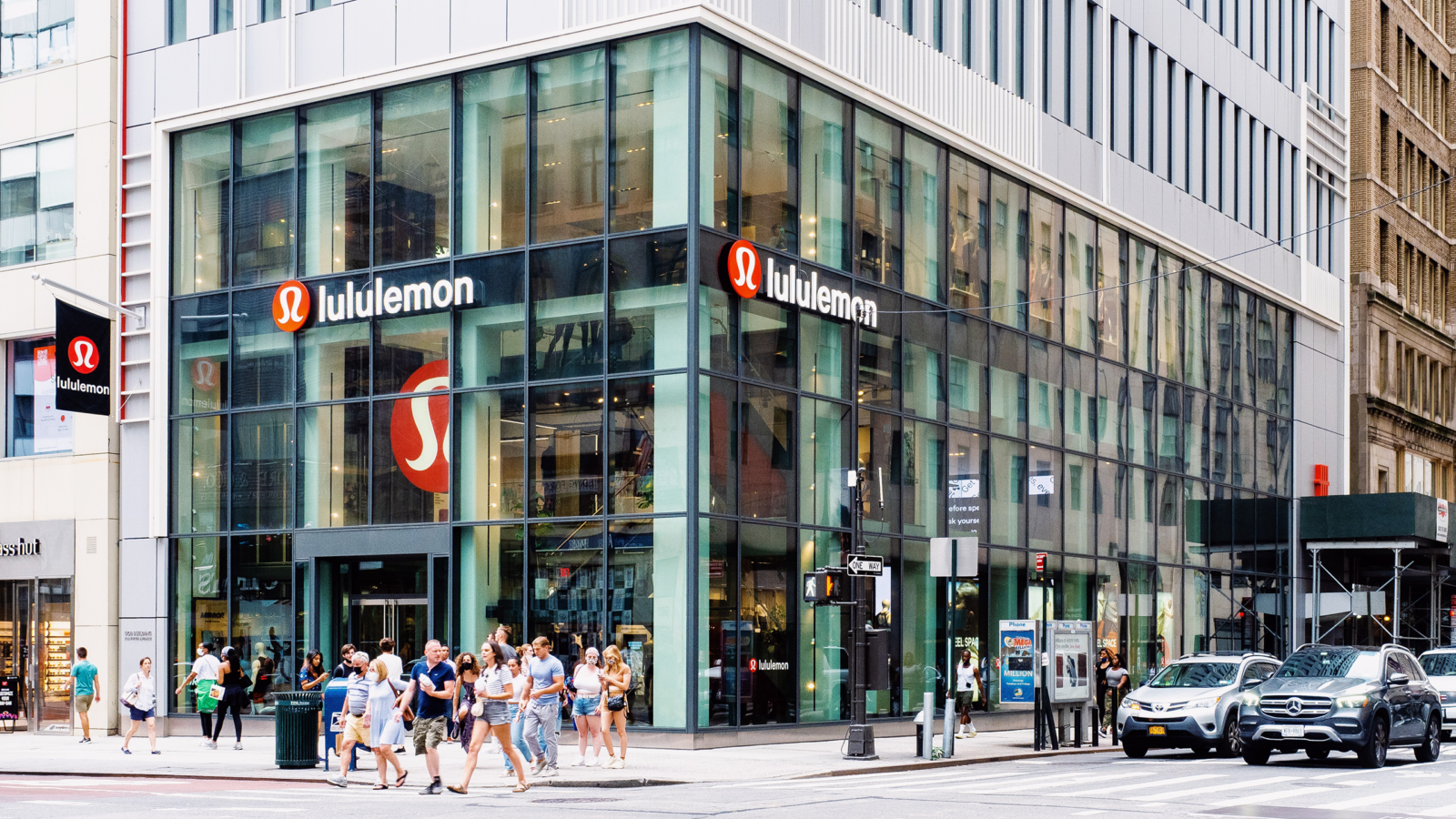Good morning.
Voting results in the UK show the Labour Party won a decisive victory in yesterday’s general election, ending 14 years of Conservative rule defined by austerity, Brexit, and an embattled prime minister whose tenure was shorter than the shelf life of a head of lettuce.
Labour leader and incoming prime minister Keir Starmer takes over just two months after the International Monetary Fund said the UK Treasury needs to tighten its belt to the tune of £30 billion ($38 billion) to stabilize the country’s debt burden. Stiff upper lip, Keir.
Tech, Drugs, and Yoga Wear: These Stocks aren’t Doing so Hot

We’re halfway through the year, and we’ve got one question: Why are these particular stocks performing so poorly?
Recently, we looked at the top-performing companies on the S&P 500, and with the exception of the ever-reliable Berkshire Hathaway and pharmaceutical juggernaut Eli Lilly, it was all Big Tech riding the artificial intelligence wave. With six months down and six more to go, we thought we’d look at the opposite end of the spectrum and highlight the businesses at the bottom of America’s major indexes.
Something is Rotten in Santa Clara
If your business makes semiconductor chips — which power our electronics and are the key to developing advanced AI tools — you’re probably very happy right now. TSMC’s share price is up 80% year-to-date; meanwhile, it’s being courted by the White House and expanding its factory footprint in Arizona. Nvidia shot past $3 trillion in market cap and occasionally tops Microsoft and Apple as the largest company in the world. So it’s wild to see Intel — a pioneer in the sector — at the bottom of the Dow.
- Its first-quarter earnings, released in April, beat Wall Street’s expectations, but the company’s second-quarter forecast was less than stellar, and Intel’s stock has fallen 35% this year. Not only does the company need to dive deep into AI, but the transistors on its chips need to get smaller if it wants to stay relevant.
- Intel hopes to get ahead of the competition with its Xeon 6 and Gaudi 3 processors, and it plans to work as an outsource manufacturer for other companies’ chips. CEO Patrick Gelsinger said Intel will be the world’s leading AI foundry by 2030. Let’s just hope investors can hold on for that long.
Index Indicator: Fashion line Lululemon and pharmacy chain Walgreens are at the bottom of both the S&P 500 and the Nasdaq 100, with their share prices plummeting 40% and 58%, respectively.
The athletic apparel company’s comparable sales in the first quarter were flat year-over-year in the Americas, stoking fears that Lululemon is falling out of touch with its customers. CEO Calvin McDonald said it failed to offer as many sizes and colors as consumers wanted, but that the issue should be fixed for the second half of the year. And it’s not alone — Nike and Under Armour are hurting, too. Walgreens, meanwhile, followed many pharmacy chains by jumping into the medical care space after acquiring a controlling stake in clinic operator VillageMD, but that gamble led to a $6 billion write-down. Help doc, it hurts.
200% Growth in Five Years

Med-X is on a mission to revolutionize pest control across the globe with more natural ingredients, and the company is inviting private investors to participate in their latest capital raise ahead of a planned NASDAQ listing.
Their Nature-Cide solution has shown to be no less effective than traditional pesticides – but the difference is, it doesn’t pollute the air or food with toxic chemicals. This has helped them increase revenue 200% in just five years.
Now, through a strategic partnership with a major international distributor, the company is set to introduce their Nature-Cide product line to 41 new markets, including Australia, New Zealand, Southeast Asia, and beyond. They’re also gearing up to leverage public equity for vertical acquisitions, further solidifying their presence in key markets like Mexico, Canada, and the EU.
As they gear up to join the NASDAQ, discover how you can invest in Med-X and be part of their vision for a greener future.**
Saks-Neiman Marcus Merger Lures Amazon, Salesforce Into Luxury
The owner of Saks Fifth Avenue reached a deal to acquire rival Neiman Marcus for $2.65 billion, the companies announced Thursday. It will create a high-end retail giant at a low point for department stores and draw in two unorthodox investors in the form of Amazon and Salesforce.
From Beaver Pelts to Chanel Belts
Saks’ Canadian owner HBC, or Hudson’s Bay Company, was founded in 1670 on a Royal Charter from King Charles II and became a fur-trading powerhouse thanks to the felted beaver hats beloved by gentlemen of the 16th to mid-19th centuries. Over 350 years later, a Charles (III, in this case) is still king, but the prospects of economic domination — with beaver hats passé and HBC now a department-store operator — are gloomier.
Spending on luxury goods in the Americas fell 8% last year, according to Bain & Co. Meanwhile, department stores, which accounted for 14.1% of US retail sales in 1993, accounted for just 2.6% last year, according to GlobalData. HBC has struggled with its books and raised $340 million through real estate sales last year to catch up on payments to suppliers. The Saks-Neiman deal is, therefore, notable for its decidedly non-department store minority investors:
- It represents one of Amazon’s most notable physical retail investments since it bought Whole Foods outright in 2017. Amazon dipped its toe into the luxury market with online “Luxury Stores,” but without the full suite of top brands like Gucci and Burberry, where Saks could help open doors (of note: Amazon made several investments in cargo airlines before launching Prime Air).
- Salesforce is the more unusual investor — it’s publicized brand partnerships with Richemont, Louis Vuitton, Delvaux, and McLaren, but a direct stake in luxury retail is an outlier from its slew of investments in tech. The future is AI and haute couture?
A source told The Wall Street Journal that the combined Saks-Neiman subsidiary, to be called Saks Global, would have $10 billion in annual sales, a fraction of the $94 billion LVMH Moët Hennessy Louis Vuitton made last year.
Sharing the Wealth: Amazon founder Jeff Bezos plans to sell 25 million shares in the company, worth almost $5 billion. It’s the first time he’s sold shares since 2021, but Amazon stock is up 30% this year, and someone’s mid-life crisis wardrobe could use an upgrade — perhaps with a trip to Neiman Marcus.
‘Minecraft’ Hedges Its Bets on Gaming
It’s not all fun and games in the gaming world.
Bloomberg reported on Wednesday that Mojang Studios, the gaming studio behind the wildly popular title “Minecraft,” is exploring new revenue streams such as merchandising, education, and content-streaming so that it’s less dependent on gaming. When a game as popular as “Minecraft” feels it can’t rely on gaming anymore, that’s when you know the industry’s in trouble.
Last Life
The gaming industry is experiencing a serious contraction. Games companies big and small have slashed headcount, and pandemic-era investment has dried up. Microsoft, which owns Mojang, has adopted a strategy of trying to transform its games division to turn it into a services-based offering. The days of simply buying a game and finishing it are over.
Piers Harding-Rolls, a games industry analyst at Ampere Analysis, told The Daily Upside “Minecraft” is pretty crucial to Microsoft’s gaming plans:
- “Ampere data shows that the console version across PlayStation and Xbox has consistently been played by around 15 million players every month over the last two years,” he said. “In that respect, it’s hugely important to Microsoft as it reaches so many people and represents the company’s biggest offering in the ‘games as a platform’ part of the market.”
- Other games like “Roblox” and “Fortnite” have pushed beyond gaming, hosting virtual concerts and brand tie-ups in their virtual worlds, and Harding-Rolls believes “Minecraft” wants to mirror that strategy of becoming more of a platform than a mere game.
Here We Go Again: While Mojang hunts for new ways to bring money in, Microsoft is still looking for ways to scrimp and save. A handful of online news outlets spotted on Wednesday that some Microsoft staff, including members of the Xbox gaming division, had announced they’d been laid off. This comes six months after the company cut 9% of its gaming division.
Extra Upside
- Panamania: Panama is the best country for living abroad, according to a survey by global expat network InterNations. Of those in the Central American nation, 82% said they were happy with their life and 74% with their financial situation.
- Lisbon Blues: Portugal’s government is reintroducing a 20% flat tax on income for skilled foreigners, which previously drew in legions of remote workers.
- Discover the future of technology with Patent Drop. Our bi-weekly newsletter tracks the latest patents filed by big tech (like Apple, Meta, Tesla). Stay ahead of the curve and subscribe for free today.
* Partner
Just For Fun
Disclaimer
**This is a paid advertisement for Med-X’s Regulation CF Offering. Please read the offering circular at https://invest.medx-rx.com/

